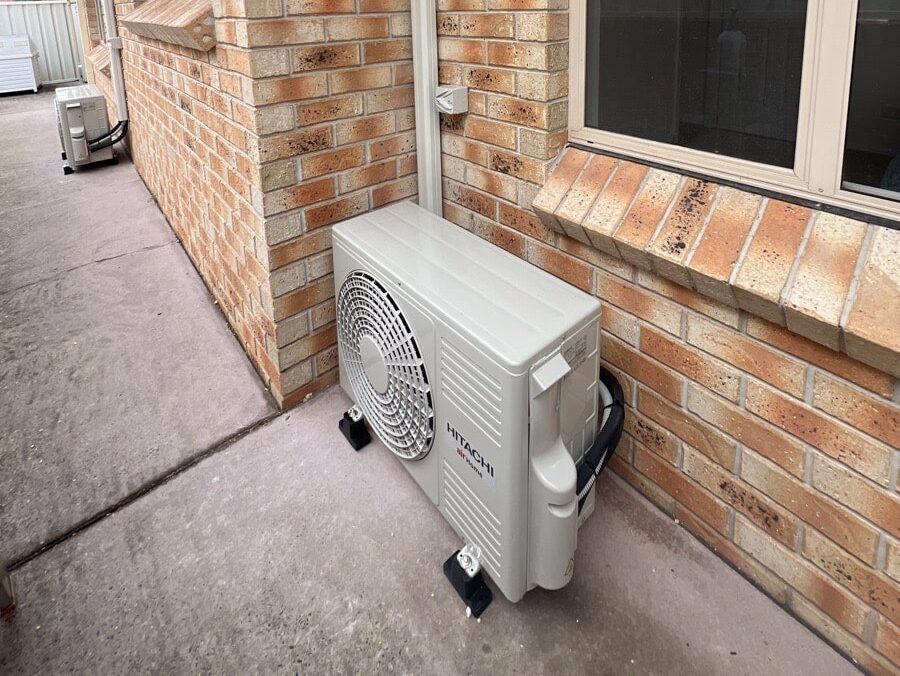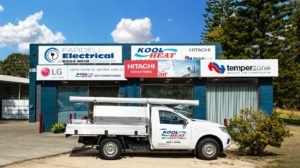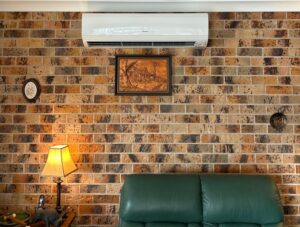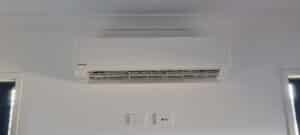When choosing an AC system for your home or office in Forster, consider the local climate’s hot, humid summers and mild winters. Prioritize systems with high SEER ratings and eco-friendly refrigerants for cost-effective performance. Ensure the system’s cooling capacity matches the space it’s cooling. Advanced filtration, like HEPA filters, boosts indoor air quality, while smart thermostats save energy. Budget for both the initial investment and long-term operational savings, possibly through rebates.
Regular maintenance is crucial, balancing DIY tasks with professional checks. Understanding these essentials sets you on the right path to optimal cooling solutions. For further insights, explore the nuanced considerations.
Key Takeaways
– Assess local climate conditions in Forster to determine cooling needs for both home and office AC systems.
– Prioritize energy-efficient systems with high SEER ratings to ensure cost-effective operation in both environments.
– Consider air quality improvements with advanced filtration systems, especially in office spaces with high occupancy.
– Evaluate the size and layout of the space to match AC capacity, ensuring optimal comfort and efficiency.
– Balance DIY maintenance with professional services to maintain system reliability and performance in both settings.
Understanding Climate Needs
To choose the right AC system, you must first assess your climate needs by considering local temperature ranges, humidity levels, and seasonal variations. In Forster, where summers can be hot and humid, and winters mild, it’s important to focus on climate adaptability to ensure your AC system can handle these conditions effectively.
Evaluate the average high and low temperatures throughout the year to determine the necessary temperature control capabilities. This information will guide you in selecting a system that can efficiently cool and dehumidify your space during peak summer months while maintaining comfort in the cooler seasons.
Consider humidity levels as they play a crucial role in indoor comfort. High humidity can make it feel warmer than the actual temperature, so an AC system with a dehumidification feature is essential. This feature helps in maintaining an optimal indoor environment by removing excess moisture from the air, enhancing overall climate adaptability.
When assessing seasonal variations, think about how often your cooling needs change. A system with variable speed settings can provide precise temperature control, making it responsive to fluctuating conditions.
Energy Efficiency Considerations
When considering energy efficiency in an AC system, prioritize models with high SEER (Seasonal Energy Efficiency Ratio) ratings to ensure optimal performance and lower operating costs. A higher SEER rating indicates better efficiency, which directly translates to energy savings over time.
It’s crucial to match the unit’s cooling capacity to your specific size requirements. An AC that’s too large or too small for your space won’t only waste energy but also fail to provide consistent comfort.
The environmental impact is another factor to consider. Opt for systems that use eco-friendly refrigerants and incorporate energy-saving features. New technological advancements, such as variable speed compressors and smart thermostats, can enhance efficiency by adjusting the system’s output to match real-time cooling demands. This adaptability reduces strain on the unit and prolongs its lifespan.
Furthermore, consider the installation and maintenance aspects. Proper installation ensures the system operates at peak efficiency, while regular maintenance can prevent energy wastage.
Air Quality and Filtration
Incorporating advanced filtration systems in your AC unit is essential for enhancing indoor air quality, and effectively capturing pollutants, allergens, and other airborne particles.
When evaluating an air conditioning system, it’s crucial to consider air purification capabilities. A high-quality air filter can significantly impact the cleanliness and freshness of your indoor environment. Filters with a high Minimum Efficiency Reporting Value (MERV) rating are more efficient at capturing microscopic particles such as pollen, mould spores, and dust mites.
Explore different filter options to ensure your AC unit meets your specific air quality needs. HEPA filters, for instance, are renowned for their ability to remove up to 99.97% of airborne particles as small as 0.3 microns.
Activated carbon filters are another excellent choice if you’re concerned about odours and volatile organic compounds (VOCs). These filters use a bed of activated carbon to absorb gases, effectively reducing unwanted smells and chemical vapours.
Don’t overlook the importance of regular filter replacement and maintenance to keep your air conditioning system running efficiently. Regular upkeep ensures optimal air purification, helping you maintain a healthier indoor atmosphere, whether you’re at home or in the office.
Cost and Budget Analysis
While optimizing air quality is important, carefully analyzing the costs and budget for your AC system ensures you make a financially sound decision without compromising on efficiency or performance.
Start with assessing the initial investment required for both home and office AC systems. Residential units typically have a lower upfront cost compared to commercial systems due to size and capacity differences. However, don’t overlook the importance of considering energy efficiency ratings which can significantly impact operational expenses.
Examine the potential for long-term savings by selecting energy-efficient models that may carry a higher initial price tag but reduce electricity bills over time. Look for units with high SEER (Seasonal Energy Efficiency Ratio) ratings, as they offer more efficient cooling per energy unit consumed. Consider any available rebates or incentives for energy-efficient systems in Forster, which can further offset initial costs.
Factor in the scalability of the system, especially for office spaces where future expansion might be necessary. A modular system can offer flexibility without requiring a complete overhaul, thus optimizing cost efficiency.
Maintenance and Support
Ensuring your AC system receives regular maintenance is crucial for enhancing its longevity and maintaining optimal performance. Start with DIY maintenance tasks like regularly cleaning or replacing air filters every one to three months, as clogged filters can impede airflow and reduce efficiency. Dusting the vents and inspecting the unit for visible debris can prevent minor issues from escalating.
However, DIY efforts only go so far. Engaging professional services is essential for comprehensive maintenance and support. Professionals conduct thorough inspections, checking refrigerant levels, testing for leaks, and ensuring electrical connections are secure. They also calibrate the thermostat for accuracy and clean evaporator and condenser coils, which can significantly boost efficiency and prevent breakdowns.
Scheduled professional services can identify potential issues before they become costly repairs, thus safeguarding your investment. When choosing between home and office air conditioning systems in Forster, consider the ease of access to local professional services. Office systems, often more complex due to their size and usage, may require more frequent professional attention compared to home units.
Understanding the balance between DIY maintenance and professional services ensures your AC system remains reliable and efficient throughout its lifespan.
Frequently Asked Questions
How Does AC Noise Level Differ Between Home and Office Environments?
In office environments, noise levels are generally higher due to centralized systems, but energy efficiency is prioritized. Home units offer quieter operation. Maintenance costs and the installation process vary, impacting overall efficiency and long-term performance.
What Are the Space Requirements for Installing an AC System in Offices?
When installing an AC system in offices, you must prioritize office layout efficiency. Ensure adherence to noise regulations to maintain productivity. Consider duct placement, ceiling height, and unit size to optimize airflow and minimize noise disruptions.
Are There Aesthetic Differences Between Home and Office AC Units?
You’re comparing design differences between home and office AC units. Home units often prioritize aesthetics, while office systems focus on energy efficiency and air quality. Maintenance costs can vary, but energy-efficient models generally reduce expenses.
How Do AC Systems Impact Productivity in Office Settings?
You’ll notice energy efficiency in AC systems boosts productivity by maintaining optimal temperature control. Health benefits arise as employee comfort improves, reducing fatigue and enhancing focus. Proper systems ensure a conducive, efficient office environment.
What Are the Installation Timeframes for Home Versus Office AC Systems?
You’re looking at shorter installation timeframes for home ACs, often a day or two. Office systems take longer due to complexity. Consider energy efficiency, cost comparison, maintenance requirements, and warranty coverage when planning installations.
Conclusion
In choosing the right AC system for your Forster home or office, focus on understanding your climate needs and prioritizing energy efficiency.
Evaluate air quality and filtration options to ensure a healthy environment.
Conduct a cost and budget analysis to balance initial investment with long-term savings.
Lastly, consider maintenance and support services to ensure your system remains reliable.
By addressing these factors, you’ll confidently select an AC system that meets your specific requirements.



